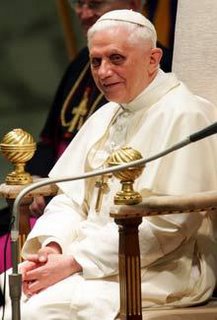[I have followed closely the development of the stories of the Vatican demanding royalty’s payments for the writing of the Pope. The below story is typical of the half-truths being published. The Vatican is not trying to find new ways to generate cash but instead clamping down on those so call writers who make money off of others. The Vatican is asking for royalties for republished works of the Popes which are SOLD. In other words if the publisher is going to sell the works for money then the publisher should give the Vatican it’s share, just as if the Pope was any other contributing author. ~ Q]
 A Vatican decree that publishers must pay royalties for the Pope's writings has shaken Italian publishers.
A Vatican decree that publishers must pay royalties for the Pope's writings has shaken Italian publishers.Pope Benedict XVI's first encyclical, God is Love, is a bestseller, as are most papal writings. But the Vatican's legal department has started going after publishers who reprint the Pope's writings, saying other authors are paid for their labours.
Publishers say they do a public service, and spread the word of God, by reprinting his works. Some say they traditionally donate any profit from publishing papal documents to charity.
Cardinal Joseph Ratzinger became Pope Benedict on April 19, 2005, and the copyright decree from the Vatican came right after his election, from the Holy See's No. 2 official, Cardinal Angelo Sodano.
The decree asserts that copyright on Benedict's works belongs "in perpetuity and worldwide" to the Vatican's publishing house, Libreria Editrice Vaticana, known as LEV.
Since then, the legal department has put some teeth into the decree.
Marco Tosatti, a Vatican correspondent for Turin daily La Stampa, and his Italian publisher, face $18,500 US in copyright fees for publishing Pope Ratzinger's Dictionary, a slim volume of the Pope's thoughts on abortion, freedom, conscience and other issues that was rushed out after his election.
Vatican lawyers also demanded 15 per cent on sales plus $4,200 US in legal fees, Tosatti told Associated Press. The demand for payment "seems to go against the very spirit of the church," he said.
The church has the attitude, "We have to evangelize, spread the word," he said, but "when someone spreads it, we make them pay."
The campaign will "terrorize" publishers and writers, said Vittorio Messori, an Italian Catholic writer.
It has certainly prompted hot debate among publishers. Some authors say it is unthinkable to put a price on papal writ.
"Let's say a government makes a law. It's in the interest of the government to have the law published. And it's in its interest to have citizens read it, in an inexpensive edition," said the Rev. Alfio Filippi, director of Edizioni Dehoniane Bologna, a religious publishing house.
The Vatican issued a similar copyright decree a month after John Paul II's 1978 election, but publishers continued to print his writings.
LEV says news organizations can quote from the pope's speeches, encyclicals and other writings without charge. They can also publish full texts for free provided they cite Vatican copyright. But if a text is published separately, they should pay royalties.
LEV's spokesperson Francesca Aida Bucciarelli said enforcing copyright helps ensure that the Pope's writings are correctly reproduced. "It is the Pope who wanted his texts protected, who asked for this," she said.
Some publishers are falling into line with the papal request. Andrea Tornielli of the Milan daily Il Giornale reprinted the late John Paul II's will and testament shortly after his death. He wrote that his publisher would pay a $6,000 copyright fee rather than risk the book being confiscated.
This Post's Link

No comments:
Post a Comment